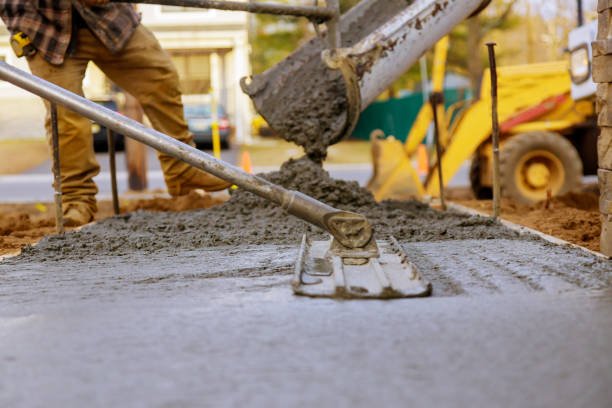When it comes to deciding between pavement vs concrete, homeowners often find themselves weighing the trade-offs between aesthetics, cost, maintenance, and longevity. This decision is crucial because your driveway or patio is one of the most visible features of your property and can greatly affect both curb appeal and property value. Making the right choice requires a clear understanding of the characteristics, advantages, and disadvantages of each material. In this blog, we’ll break down the key differences between concrete, asphalt, and pavers, helping you make an informed decision for your home.
Understanding the Options
Concrete
Concrete has been a staple material for driveways, sidewalks, and patios for decades. Made by combining cement, water, sand, and aggregate, concrete creates a solid slab that provides excellent load-bearing capacity. One of its primary benefits is durability. A properly installed concrete driveway can last decades without major structural issues. Concrete is also versatile; it can be poured into any shape and finished in a variety of textures and colors to enhance visual appeal.
However, concrete is not without challenges. One major concern is its tendency to crack over time due to ground shifts, extreme weather changes, or heavy loads. Once cracks appear, repairs can be noticeable and may require replacing large sections. Additionally, concrete requires proper curing after installation. During the curing period, special care must be taken to prevent premature drying, which can weaken the slab and lead to further cracking. Maintenance is another consideration—concrete surfaces typically require periodic sealing to prevent stains, water infiltration, and weather-related damage.
Asphalt
Asphalt is another popular paving material known for its affordability and quick installation. Made from a mixture of aggregates and bitumen, asphalt creates a smooth, black surface ideal for driveways and roadways. One of the advantages of asphalt is its lower initial cost compared to concrete, making it an attractive option for homeowners on a budget. It can also be installed relatively quickly, allowing for faster project completion.
Despite these advantages, asphalt has its drawbacks. Its lifespan is generally shorter than concrete or pavers, and without proper maintenance, it can deteriorate quickly. Regular sealcoating is necessary to protect the surface from moisture, sun exposure, and wear and tear. Asphalt is also sensitive to temperature fluctuations; it can soften and deform in extremely hot weather, and cracking may occur in colder climates. Aesthetically, asphalt is less flexible—its dark, uniform appearance may not appeal to homeowners seeking a more decorative or customized driveway design.
Pavers (Interlocking / Concrete Pavers)
Pavers are individual units made of concrete, brick, or natural stone that are laid in specific patterns to create durable and visually appealing surfaces. One of the most significant advantages of pavers is their versatility. Available in a wide variety of colors, shapes, and textures, pavers allow homeowners to create unique and customized designs that complement their landscaping and architecture. From traditional patterns to modern geometric layouts, the design possibilities are virtually endless.
Durability is another strength of pavers. When properly installed, they can withstand heavy loads, resist cracking, and endure harsh weather conditions. Unlike monolithic concrete slabs, pavers are flexible and can move slightly with ground shifts, reducing the risk of permanent cracks. Repairs are also simple—if a paver becomes damaged, it can be individually removed and replaced without disturbing the surrounding area. Additionally, permeable pavers provide an eco-friendly option by allowing water to drain through the joints, helping manage stormwater and reduce runoff. The main drawback of pavers is their higher upfront cost compared to asphalt or standard concrete. Installation is labor-intensive, requiring a well-prepared base, precise placement, and proper joint filling.
Comparing Durability, Maintenance, and Cost
When deciding between pavement vs concrete or other materials, it is essential to evaluate key factors such as cost, maintenance, longevity, and aesthetics.
-
Cost:
-
Asphalt is generally the most affordable option for initial installation.
-
Concrete falls in the mid-range, depending on customization and finishes.
-
Pavers usually have the highest upfront cost but offer long-term value through durability and repair flexibility.
-
-
Maintenance:
-
Asphalt requires routine sealcoating and minor repairs to maintain its lifespan.
-
Concrete needs periodic sealing and repair of cracks, which can be noticeable.
-
Pavers require minimal maintenance, and repairs can be done selectively by replacing individual units.
-
-
Longevity:
-
Asphalt typically lasts 10–20 years, depending on climate and maintenance.
-
Concrete, when installed correctly, can last several decades with minimal issues.
-
Pavers, with proper installation, are extremely long-lasting due to their flexibility and ease of repair.
-
-
Aesthetics:
-
Concrete offers a clean and modern look but is limited unless stamped or colored.
-
Asphalt provides a functional and uniform surface with limited visual appeal.
-
Pavers offer unmatched design flexibility, allowing for creative patterns, colors, and textures that enhance curb appeal.
-
Key Considerations for Your Decision
Selecting the right material involves evaluating your specific needs and circumstances:
-
Budget: If cost is your primary concern, asphalt may be the best option for a quick and economical solution.
-
Longevity: Homeowners seeking a long-term investment may prefer pavers or high-quality concrete.
-
Maintenance: Consider how much effort you are willing to put into maintenance, such as sealcoating or crack repair.
-
Design and Aesthetics: For a unique and visually appealing surface, pavers provide endless design possibilities.
-
Climate: In areas with extreme weather or freeze-thaw cycles, flexible materials like pavers often perform better than rigid concrete slabs.
Environmental and Practical Factors
Beyond aesthetics and cost, environmental factors should also play a role in your decision. Permeable pavers, for instance, allow water to filter through the joints, reducing runoff and helping prevent erosion. Concrete can be treated to improve water drainage, but traditional asphalt does not allow water penetration and may contribute to stormwater issues. Additionally, heat retention is a consideration. Asphalt absorbs heat, making it hotter during summer months, while pavers and concrete reflect more sunlight and can help moderate surrounding temperatures.
Another practical consideration is the ease of future modifications. Pavers offer the flexibility to redesign or expand areas without major demolition. Concrete slabs, on the other hand, are permanent, and modifying them can be costly and labor-intensive. Asphalt is less flexible for modifications and repairs, often requiring resurfacing to address damage.
Conclusion
The choice between pavement vs concrete is ultimately not about which material is universally better, but which option best aligns with your priorities, lifestyle, and property needs. Asphalt is a cost-effective and fast solution suitable for homeowners seeking an economical driveway. Concrete offers strength, stability, and a solid lifespan when properly maintained. Pavers provide unmatched design flexibility, ease of repair, and long-term durability, making them a top choice for those focused on aesthetics and quality.
For expert advice, professional installation, and exceptional results in Palm Beach County, trust PUP Pavers & Turf Inc. Our experienced team can help you navigate the decision between pavers, concrete, or asphalt, ensuring your driveway or patio is both beautiful and long-lasting. We pride ourselves on delivering high-quality craftsmanship tailored to your unique needs, making your outdoor space both functional and visually appealing.
visit: zynrewards




Leave a Reply